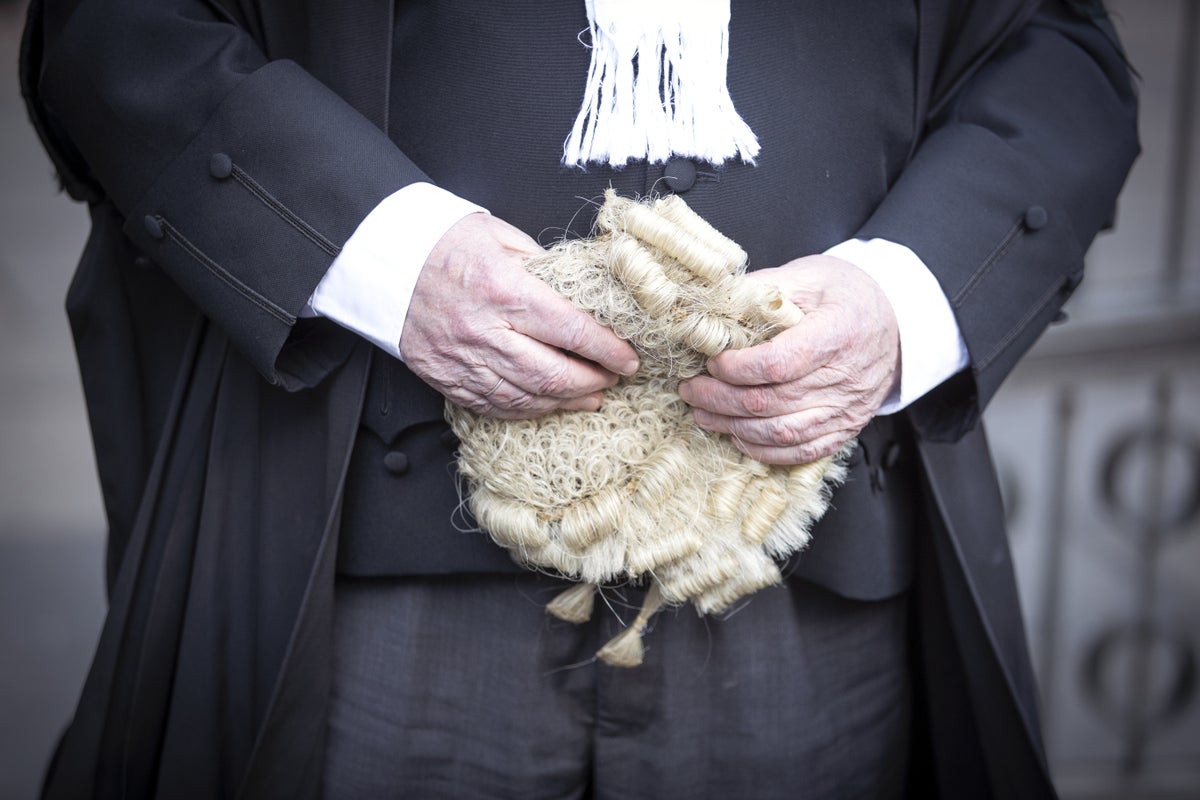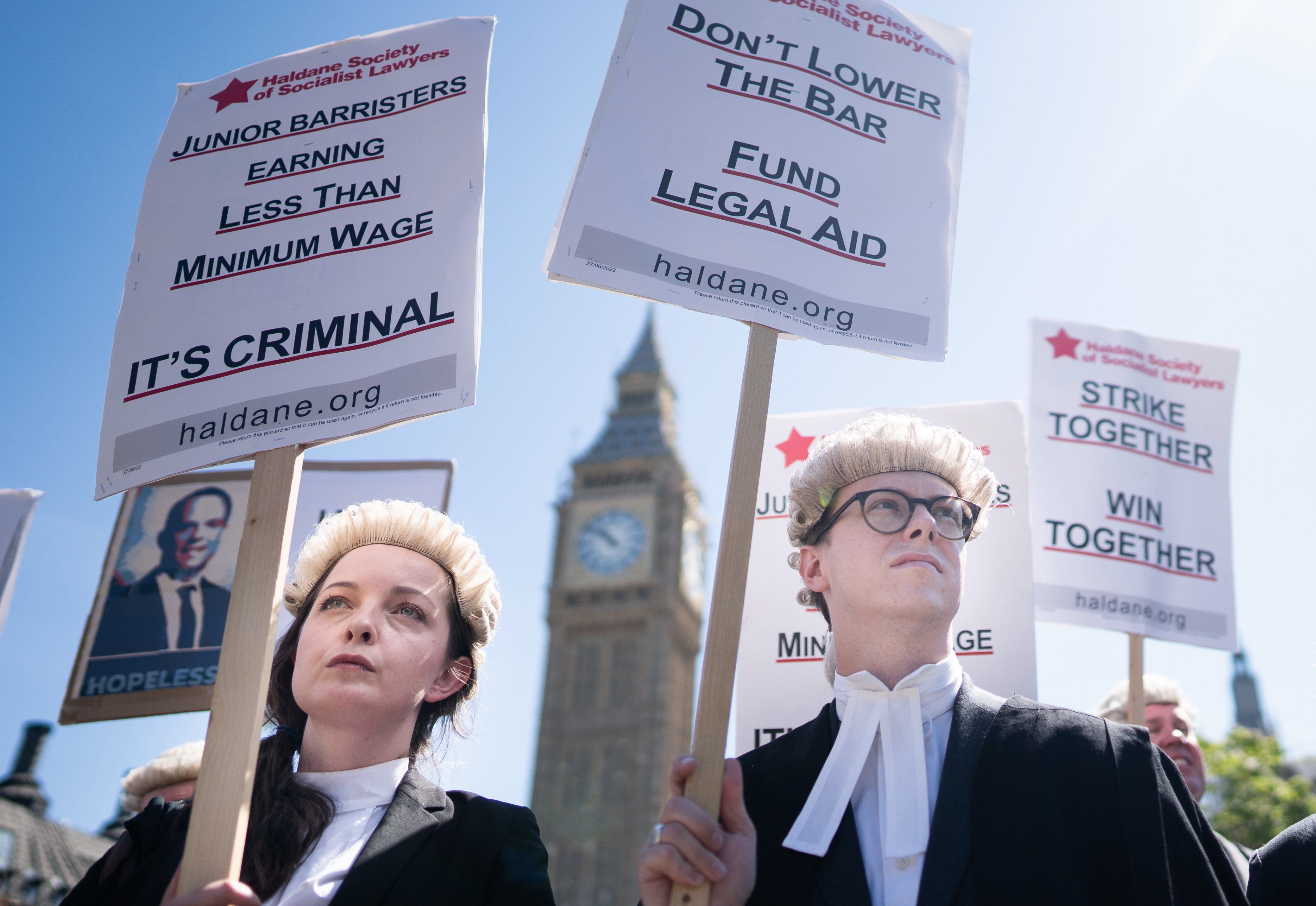
Delays to criminal trials affected by the ongoing barristers’ strike may not be a good enough reason to keep defendants in custody on remand if the dispute continues beyond the end of November, High Court judges have said.
The Director of Public Prosecutions (DPP) Max Hill KC brought a challenge against decisions made in two separate cases in Bristol and Manchester, where judges refused to extend the custody time limits of three defendants whose trials were delayed due to the unavailability of barristers.
In a ruling on Wednesday, Dame Victoria Sharp and Mr Justice Chamberlain ruled that the judges in those cases “fell into legal error” when refusing to keep defendants behind bars earlier this month.
However, they refused to overturn the decisions not to extend the custody time limits, saying there was no point in doing so as there is no power to extend those limits which have now expired.

In the ruling, Dame Victoria and Mr Justice Chamberlain said that, for the time being, adjournments to trials resulting from the unavailability of defence counsel “may” be a “good and sufficient cause” to extend custody time limits.
They added that the question of whether such adjournments do represent a sufficient cause for extending a time limit “will be case-specific” and require the consideration of a number of factors in cases.
But the judges warned that, if the dispute between the Criminal Bar Association (CBA) and the Government continues beyond the end of November then it is “unlikely” to remain a valid reason.
They said the “relevant point at which the unavailability of legal representation can properly be described as chronic or routine is likely to be reached by the last week in November 2022” – three months on from the announcement of the CBA’s indefinite strike action.
The judges added: “Once this point is reached, the absence of legal representation in the context of the CBA action is unlikely to be capable of supplying a sufficient reason for extending custody time limits.”
They also described the current strike action as “unprecedented” and warned Crown Court judges they must “refrain from endorsing the position of either side” in the ongoing dispute – but that did not mean they had to “ignore reality”.
They said: “Indeed, they must scrupulously avoid doing so, whatever their own personal views about the merits. In short, they must not enter the fray.
“This does not mean, however, that judges are required to ignore reality.
“If, as a matter of fact, the effect of the CBA action is to make representation unavailable in a large proportion of cases, that fact must be confronted.”
Their ruling said it was not necessary for judges “to inquire into the root causes of the present dispute” and that “attribution of fault is irrelevant”.
A Ministry of Justice spokesman said: “We welcome the judgment which recognises that the ongoing strike action does give sufficient cause to extend custody time limits.
“Judges make bail decisions independently of Government but protecting the public will remain our top priority.”
While it is invidious for any view at all to be expressed on the merits of the industrial action, the prospect that judges will reach different conclusions on the issue is one which will lead to inconsistent and unfair results— Tom Little, KC
At a hearing earlier this week, lawyers representing Mr Hill argued the Crown Court judges were “wrong” to express views over the merits of the pay dispute between the Government and lawyers.
The judges had concluded that the unavailability of defence barristers, due to ongoing industrial action by members of the CBA was not a “good and sufficient cause” to keep the defendants locked up on remand while their trials were delayed.
Tom Little KC, representing the DPP, argued in written submissions at a hearing in London on Monday that it was “inappropriate for applications for extensions to custody time limits to be determined based on the individual views of judges as to the competing arguments in the dispute”.
He added: “While it is invidious for any view at all to be expressed on the merits of the industrial action, the prospect that judges will reach different conclusions on the issue is one which will lead to inconsistent and unfair results.”
In recent weeks, court hearings across England and Wales have been put off due to the unavailability of some barristers who are taking part in the continuous walkout.
Mr Hill has previously described the issues raised by the cases at the centre of his challenge as “a matter of the greatest importance to the running of the criminal justice system in the next few weeks”.
Judge Peter Blair KC, sitting at Bristol Crown Court earlier this month, ruled that the absence of a lawyer arose out of the “chronic and predictable consequences of long-term underfunding”, highlighting that the Government had “many, many months” to resolve the pay dispute.
Mr Little argued that Judge Tina Landale, who reached the same view in a separate case in Manchester, placed “tacit reliance” on Judge Blair’s ruling, with her judgment’s wording being “either identical or similar”.
He told the court that “properly analysed, these two respective decisions involved a view being expressed as to fault”.
He added: “In other words, this is the Government’s fault.”
Mr Little added: “The judges formed a view which they expressed in the course of their ruling which was one, we submit, should not have been formed.”
David Hughes, representing a Bristol defendant – who is an interested party to the High Court challenge, along with the two defendants in the Manchester case – said Judge Blair said “nothing… that was wrong, improper or inaccurate” and made “no error of law”.
The barrister said Judge Blair was not expressing a view but “just expressing what the reality of the situation is”, including that the dispute has been going on for many months.
Benjamin Knight, representing one of the Manchester defendants, said that Judge Landale “did not stray into assessing the merits of the CBA action” but had noted it was “foreseen and foreseeable… that such a problem would arise”.
Barry Grennan, representing the other Manchester defendant, argued that the barrister pay dispute had become a “predictable and persistent problem” that dated back to April.
Bruno Min, legal director at Fair Trials, a criminal justice campaign organisation, said: “It is unjust to hold people awaiting trial in prison for extended periods of time because of failings within the criminal justice system.
“But thousands of legally innocent people have been held in prison for over six months because of the long-standing backlog of criminal cases.
“Instead of challenging judges’ decisions to release people, the Government should be taking urgent steps to tackle the underlying causes of the crisis within the criminal justice in England and Wales.”







